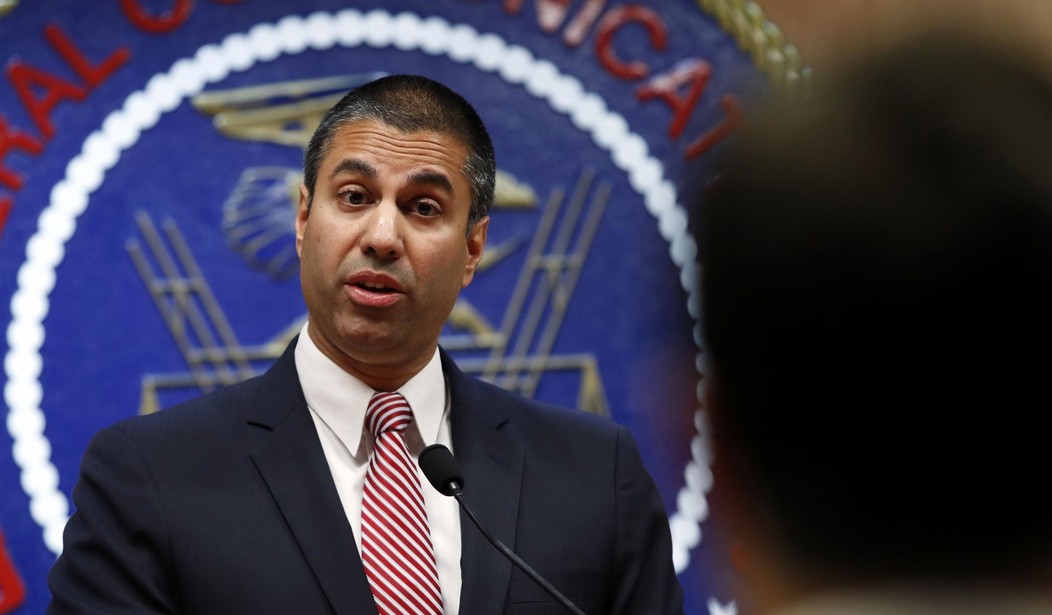The freak-out was something to behold.
A regulatory regime that had been in effect for less than three years was removed in much the same way it was put in place — without Congress making or repealing any law.
You might think that this would have been the scandal: unconstitutional government! An out-of-control regulatory body flailing about from one policy to another, based on . . . the President In Charge. Not Congress. The President.
Which may explain why the nixing of net neutrality by the Federal Communication Commission the other day was such a big deal, especially on the left.
It’s not really about the Net. It’s about the Donald — and the end of the Obama Era. Which may be why public figures with apparently less knowledge of network economics than I have so vociferously denounced the FCC’s move — folks like Jimmy Kimmel, who called the FCC’s policy change “despicable” and Ajit Pai, the new FCC chairman, a “jackhole.”
The uproar on Twitter was, well, Twitterish. An actor calling Pai “a monster” caught the general tenor. And we could count on CNN for just the right note of panic, titling one of its reports “The End of the Internet as We Know It.”
Doesn’t this feel less substantive and more like a way to channel anti-Trump sentiment?
The hysteria levels are telling.
I know, I know: there are actual arguments for net neutrality. Non-Trump-hating reasons. But why the freak-out levels, the sky-is-falling rhetoric?
The Internet had stumbled along just fine until 2015, when President Barack Obama’s FCC put “net neutrality” in place — a point Ajit Pai ably makes in his defense. (And he could use defenses, considering all the death threats he has received.) Do the doom-sayers really believe that a set of regulations that had been in place just a few years was going to “ruin the Internet” and unleash Big Corporations upon the world to the detriment of regular consumers and start-up service providers?
Recommended
Especially given that net neutrality finds support from some of the biggest Internet corporations out there (Google, Netflix, AT&T) and opposition from small ISPs?
To the extent that this is not sublimated #ResistTrump sentiment, the furor is the result of a naïve Faith in Government.
Many net neutrality supporters think that their favored regulatory scheme “frees” the Internet. And while a few of the arguments sure seem compelling, I cannot help but note that little “freeing” goes on when it comes in the form of 400 pages of regulations, which is what net neutrality brought us.
Generally, “more regulation” does not equate to “freedom.”
Besides, too many folks think that regulations do what is claimed for them; that big businesses hate regulation (they are often regulations’ biggest supporters); and that regulations to prohibit or cap or “floor” prices help consumers.
Instead, the partisans of Big Government dogmatically assert that the best way to curb corporate power is to give more power to government . . . even as they decry the current president as “literally” Hitler.
Giving more power to Hitler seems like a bad idea.
But note the fact that Trump’s “jackhole” at the FCC removed some power of government over the Internet, which might indicate that, well, Trump is not Hitlerian.
After all, Hitler’s Third Reich consolidated Nazi party control over media. Turning media into a propaganda wing was one of its defining features. It’s one reason playing the “Hitler card” is so effective. Surely none of us want government control over speech and the press — and of course the Internet is the greatest “press” realm since movable type. In the age of the NSA, we do not need another federal bureaucracy or cabal riding herd over our communications.
What we need most is not the enforced neutrality of businesses with each other, but the constitutional neutrality of government towards everybody.
Government neutrality is key. With that in mind, the death of net neutrality should appear less catastrophic. It will not doom the Internet. More likely it will allow the Net to flourish . . . without partisan or bureaucratic meddling.

























Join the conversation as a VIP Member